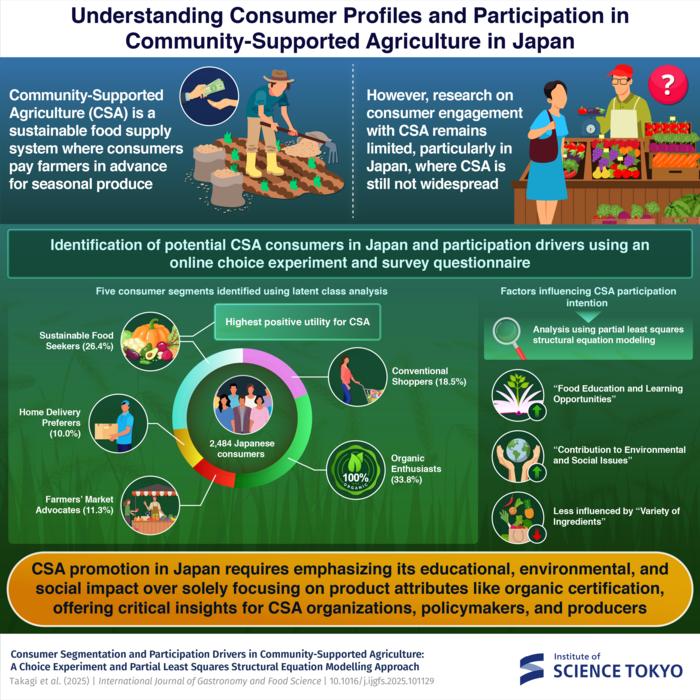Community-Supported Agriculture (CSA) in Japan presents a unique landscape for agricultural practices and consumer engagement. Unlike many Western countries where CSA has flourished, Japan’s move towards this model is still nascent, raising critical questions about consumer participation and cultural implications. Recent research led by Mr. Sota Takagi at the Institute of Science Tokyo sheds light on what drives Japanese consumers to participate in CSA by investigating the factors that influence their decisions.
The environmental consequences of conventional food systems are well-documented, with excessive fertilizer use and greenhouse gas emissions being significant contributors to ecological degradation. As a result, there is a global call for sustainable alternatives such as Community-Supported Agriculture. CSA offers a solution by allowing consumers to pre-pay for a share of the harvest, ensuring financial stability for farmers and fostering a connection between producers and consumers. This model not only promotes local food systems but also encourages a greater awareness of agricultural processes.
Despite the numerous benefits associated with CSAs, there has been limited research into consumer behavior and motivations, especially in non-Western contexts like Japan. This gap in understanding emphasizes the need for comprehensive studies to analyze how cultural differences impact consumer participation in innovative farming models like CSA. The significance of these studies extends beyond consumerism; they could potentially influence agricultural policies and community initiatives aimed at building sustainable food systems.
To address this knowledge gap, the research team—which comprises experts from various fields at the Institute of Science Tokyo—embarked on a meticulous study of CSA in the Japanese context. By utilizing an online survey method, they engaged 2,484 Japanese consumers to gather data on their preferences and awareness of CSA. The survey included factors such as consumer preferences for locally grown produce, awareness of organic certification, and their willingness to engage financially in CSA initiatives.
The researchers identified several consumer segments based on preferences revealed in the survey. Five main groups emerged: "Conventional Shoppers," "Organic Enthusiasts," "Farmers’ Market Advocates," "Home Delivery Preferers," and "Sustainable Food Seekers." Notably, "Sustainable Food Seekers" made up 26.4% of respondents, showing the most significant interest in CSA. They were drawn to the model’s ethical implications, including environmental benefits and community involvement, rather than merely focusing on the product attributes of organic certifications or diverse produce.
Statistical analyses employed in the study allowed the researchers to delve deeper into motivations behind consumer choices. Key elements associated with CSA participation emerged, focusing on gains such as "Food Education and Learning Opportunities" and the "Contribution to Environmental and Social Issues." These aspects resonated strongly with the Japanese public, suggesting a cultural alignment with collective responsibility and awareness of environmental impacts.
Interestingly, the survey revealed an apparent disconnect when it came to consumer knowledge of CSA terminology. A substantial 75.4% of respondents indicated they were unfamiliar with the term "Community-Supported Agriculture," highlighting a critical barrier for the model’s promotion within Japan. Efforts to educate the public on CSA and its benefits must prioritize increasing awareness while reframing the narrative to resonate culturally with Japanese consumers.
This study suggests that effective CSA promotion requires a shift away from solely marketing organic certification and produce variety towards emphasizing the broader educational, social, and environmental impacts of participating in CSA. Such an approach aligns with Japan’s national focus on food education, which aims to create an informed consumer base that understands the overarching benefits of sustainable food systems.
The findings of this research are essential not only for CSA organizations and farmers but also for policymakers striving to foster sustainable agricultural practices across Japan. As CSA continues to grow in recognition, insights gained from understanding consumer motivations will be critical for allocating resources and developing programs that effectively engage potential participants.
Promotional strategies must also address the inherent cultural diversity found in consumer preferences, acknowledging that behaviors can vary widely even within a single nation. The study’s outcomes indicate that recognizing these cultural nuances may significantly enhance outreach efforts and ultimately lead to increased participation in CSAs.
As Japan explores the potential of community-supported agriculture, the insights derived from this study warrant attention across the global agricultural landscape. The cultural and psychological dimensions impacting consumer behavior hold lessons that transcend borders, offering a framework for understanding consumer engagement in similar initiatives worldwide. The future of agriculture hinges on our ability to adapt traditional practices and innovate in response to emerging societal needs, making studies like this a cornerstone for practical change.
In conclusion, the research conducted by the team at the Institute of Science Tokyo not only fills a critical gap in understanding the consumer’s role in CSA but also provides strategic insights for broader agricultural and environmental policies. Increasing consumer participation may rely heavily on marketing strategies that resonate with local cultural values and on creating informed communities that appreciate the multifaceted benefits of participating in community-supported agriculture.
This research serves as a foundational framework for future studies aimed at exploring consumer engagement in food systems, suggesting that the journey towards a sustainable agricultural future is underpinned by a deep understanding of consumer motivations and cultural context.
Subject of Research: Community-Supported Agriculture participation in Japan
Article Title: Consumer segmentation and participation drivers in community-supported agriculture: A choice experiment and partial least squares structural equation modelling approach
News Publication Date: 13-Feb-2025
Web References: International Journal of Gastronomy and Food Science
References: Not applicable
Image Credits: Institute of Science Tokyo
Keywords: Community-Supported Agriculture, Japan, Consumer Behavior, Sustainability, Agriculture, Environmental Impact, Food Education, Consumer Segmentation, Agricultural Policies, Local Food Systems.




